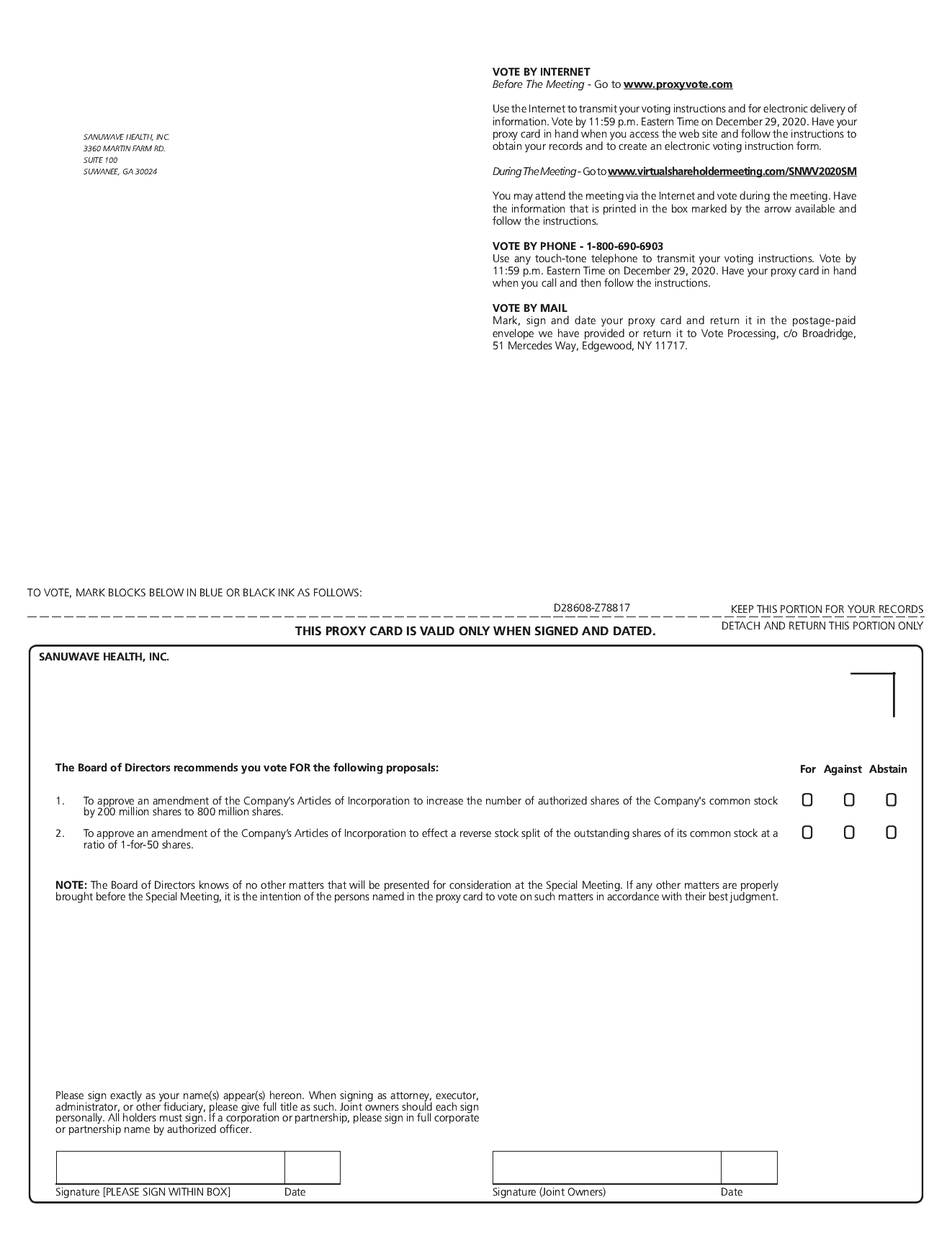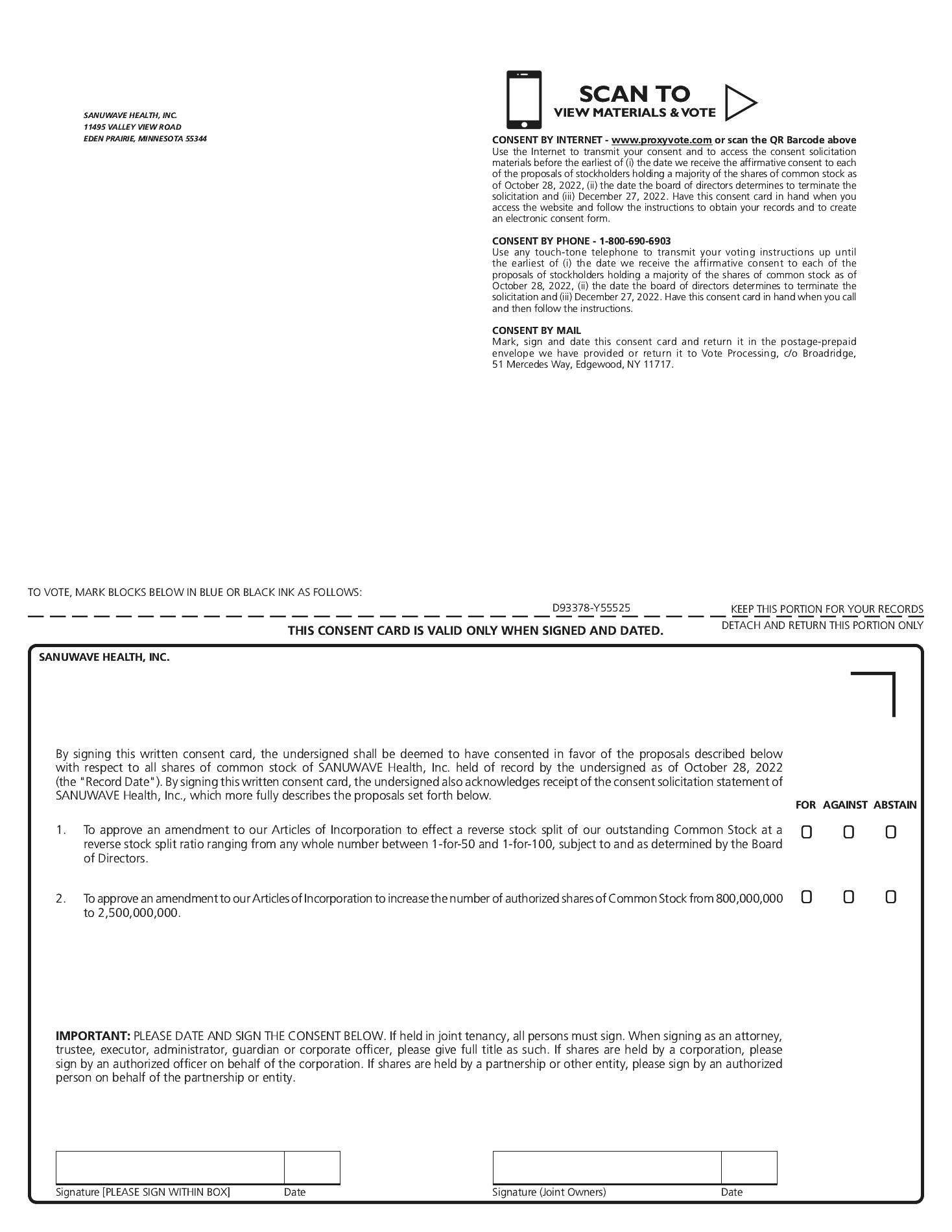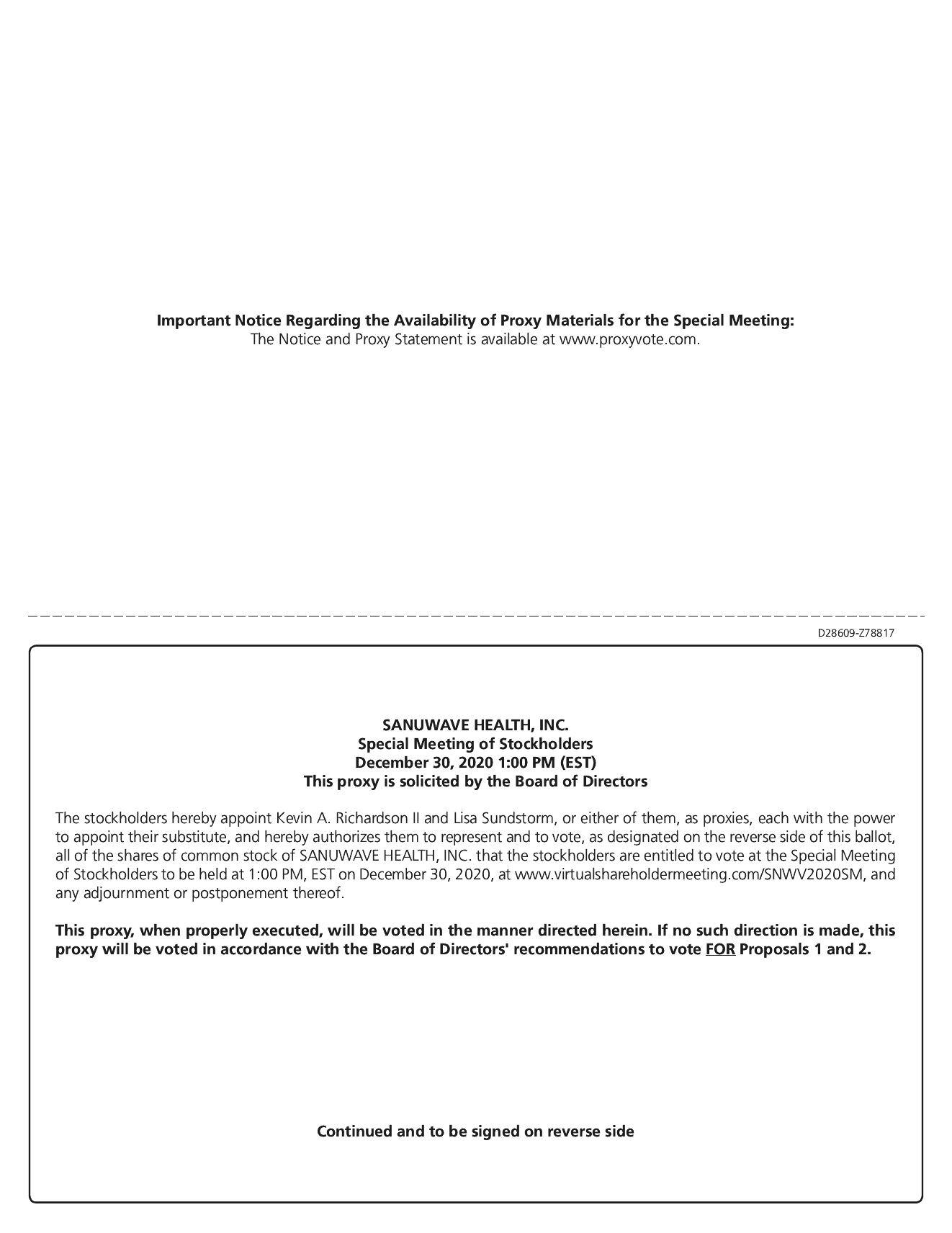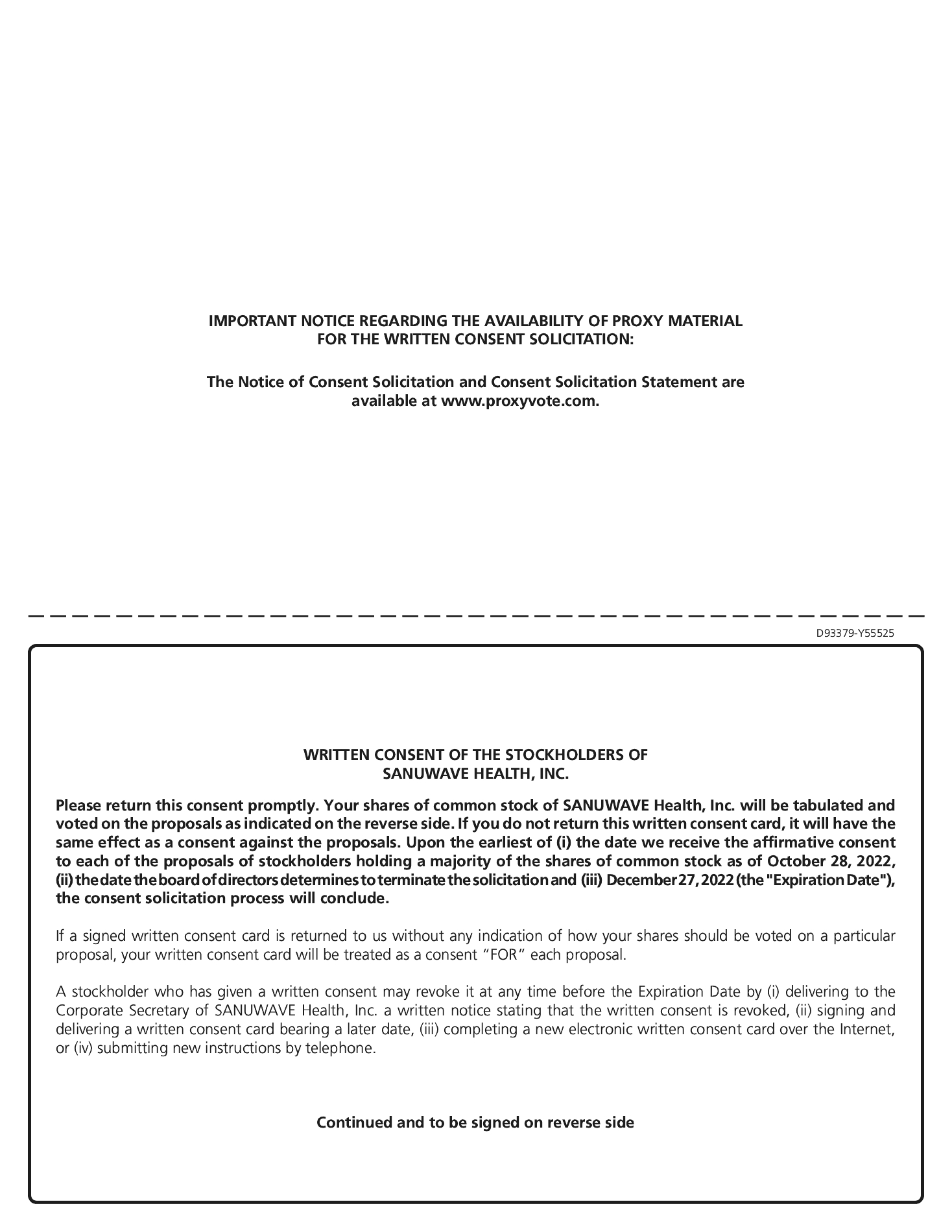
PROXYCONSENT SOLICITATION STATEMENT
FOR THE 2020 SPECIAL MEETING OF STOCKHOLDERS
December 30, 2020
QUESTIONS AND ANSWERS ABOUT THESE PROXY MATERIALS AND VOTING
WhyThis Consent Solicitation Statement and accompanying Notice of Consent Solicitation (“Notice”) are these proxy materials being made available?furnished to you by SANUWAVE Health, Inc., a Nevada corporation (“we,” “us,” “our” or the “Company”), in connection with the solicitation of written consents from the holders of its common stock, par value $0.001 (the “Common Stock”), to take action without a stockholders’ meeting.
On or about December 14, 2020,November 18, 2022, we willintend to mail to our stockholders of record and beneficial owners a 2020 Special Notice, (“Notice”)this Consent Solicitation Statement and Proxythe written consent card set forth in Appendix A (collectively, the “consent solicitation materials”).
IMPORTANT NOTICE REGARDING THE AVAILABILITY OF PROXY MATERIAL
FOR THE WRITTEN CONSENT SOLICITATION
The Notice of Consent Solicitation and Consent Solicitation Statement (the proxy materials).are available at www.proxyvote.com.
QUESTIONS AND ANSWERS ABOUT THESE CONSENT SOLICITATION MATERIALS
Why are these consent solicitation materials being made available?
We are providing you with these proxyconsent solicitation materials because the boardour Board of directors of SANUWAVE Health, Inc. (which we refer to in this proxy statement as “we,Directors (the “Board” “us,” “our,” “SNWV” and the “Company”) is soliciting written consents from the holders of our Common Stock to take action without a stockholders’ meeting.
We are soliciting your proxywritten consent with respect to votethe following proposals (the “Proposals”):
Proposal 1 (“Proposal 1”): To approve an amendment to our Articles of Incorporation to effect a reverse stock split of our outstanding Common Stock at a reverse stock split ratio ranging from any whole number between 1-for-50 and 1-for-100, subject to and as determined by the 2020 Special MeetingBoard.
Proposal 2 (“Proposal 2”): To approve an amendment to our Articles of StockholdersIncorporation to increase the number of authorized shares of Common Stock from 800,000,000 to 2,500,000,000.
This solicitation is being made on the terms and subject to the conditions set forth in this Consent Solicitation Statement and the accompanying written consent card. Written consents shall be solicited until the earliest of (i) the date we receive the affirmative consent to each of the Proposals of stockholders holding a majority of the shares of Common Stock as of the Record Date, (ii) the date the Board determines to terminate the solicitation and (iii) December 27, 2022 (the “Special Meeting”“Expiration Date”), and any adjournments. If the requisite number of written consents for a Proposal is received on or postponement thereof,prior to be held via a live audio webcast on December 30, 2020, at 1:00 pm (Eastern Time). You are invited to virtually attend the special meeting by visiting www.virtualshareholdermeeting.com/SNWV2020SM where youExpiration Date, such Proposal will be able to listen todeemed approved on the meeting live, submit questions and vote online. However, you do not need to virtually attend the meeting to vote your shares. Instead, you may simply vote your shares by proxy via the Internet or by completing, signing and returning the enclosed proxy card.Expiration Date.
What is the purpose of the Special Meeting?
At our Special Meeting, stockholders will vote upon the following two matters scheduled for a vote:
1.
| To approve an amendment to the Company’s Articles of Incorporation to increase the number of authorized shares of the Company’s common stock by 200 million shares to 800 million shares (“Proposal 1”); and |
2.
| To grant the Board the authority to effect a reverse split of the Company’s outstanding common stock, par value $0.001 per share (the “Common Stock”), at an exchange rate of 1-for-50 (“Proposal 2”). |
Could other matters be properly brought before the Special Meeting?
The Board knows of no other matters that will be presented for consideration at the Special Meeting. If any other matter is properly brought before the Special Meeting, the proxy holders appointed by our Board will have the discretion to vote on those matters for you in accordance with their best judgment.
What proxyconsent solicitation materials are available on the Internet?
The 2020 Special Meeting ProxyNotice, this Consent Solicitation Statement isand the written consent card set forth in Appendix A are available at www.proxyvote.com
How do I attend the Special Meeting?
The 2020 Special Meeting will be held entirely online via audio webcast to allow greater participation. You may attend, vote and ask questions at the Special Meeting by following the instructions provided on the Notice to log in to www.virtualshareholdermeeting.com/SNWV2020SM. If you are a stockholder of record, you will be asked to provide the control number from your Notice. If you are a beneficial owner of shares registered in the name of your broker, bank or other agent, follow the instructions from your broker or bank.www.proxyvote.com.
Who can vote atsubmit a written consent with respect to the Special Meeting?Proposals?
Stockholders as of the record date for the Special Meeting, December 8, 2020,close of business on October 28, 2022 (the “Record Date”) are entitled to vote atsubmit a written consent with respect to the Special Meeting. OnProposals. For each matter to be voted on,Proposal, you have one vote for each share of common stockCommon Stock you own as of the record date.Record Date. At the close of business on the record date,Record Date, there were 467,194,621548,737,651 shares of the Company’s common stockCommon Stock outstanding and entitled to vote.
How do I submit my written consent?
Your written consent is important. We urge you to submit your written consent over the Internet, by telephone or by completing and returning the written consent card set forth in Appendix A.





